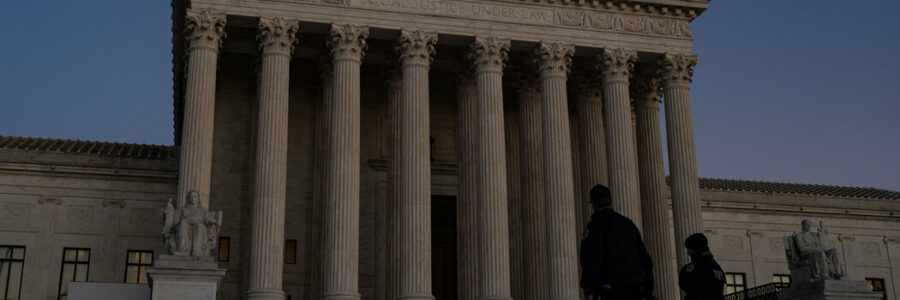
Supreme Court Seems Skeptical of Broad Sweep of Identity Theft Law
WASHINGTON — The Supreme Court seemed poised on Monday to limit the scope of a federal law that adds two years of prison time to sentences for a variety of felonies if the defendant engaged in identity theft in the process.
The case concerned Davis Dubin, who was convicted of health care fraud. Mr. Dubin, whose company provided mental health testing to young people at emergency shelters in Texas, was accused of bilking Medicaid by misrepresenting who had conducted the testing and when it was performed and by rounding up the number of hours spent carrying out the tests from 2.5 to three.
Mr. Dubin’s sentence included a two-year mandatory minimum term under a statutory provision titled “aggravated identity theft.” But the text of the provision is broad and does not seem to require identity theft in the ordinary understanding of that phrase. Rather, it requires the longer sentence if the defendant “during and in relation to” certain felonies “knowingly transfers, possesses or uses without lawful authority, a means of identification of another person.”
Jeffrey L. Fisher, a lawyer for Mr. Dubin, said his client had not used a patient’s identity in any meaningful way, adding that the nature of the conduct mattered. “It has to be a lie about who receives services or who obtains services,” he said, “not a lie about how those services were rendered.”
The justices tried to test the limits of that argument. Justice Clarence Thomas asked, for instance, about a valet parking a Porsche, noting that “I don’t have one.”
Understand the U.S. Supreme Court’s Term
A race to the right. After a series of judicial bombshells in June that included eliminating the right to abortion, a Supreme Court dominated by conservatives returned to the bench in October — and there are few signs that the court’s rightward shift is slowing. Here’s a closer look at the term:
Affirmative action. The marquee cases of the term are challenges to the race-conscious admissions programs at Harvard and the University of North Carolina. While the court has repeatedly upheld affirmative-action programs, a six-justice conservative supermajority may put more than 40 years of precedent at risk.
Voting rights. The role race may play in government decision-making also figures in a case that is a challenge under the Voting Rights Act to an Alabama electoral map that a lower court had said diluted the power of Black voters. The case is a major new test of the Voting Rights Act in a court that has gradually limited the law’s reach in other contexts.
Discrimination against gay couples. The justices heard an appeal from a web designer who objects to providing services for same-sex marriages in a case that pits claims of religious freedom against laws banning discrimination based on sexual orientation. The court last considered the issue in 2018 in a similar dispute, but failed to yield a definitive ruling.
Tech companies’ legal shield. The court is reviewing a sweeping law that prevents tech companies such as Facebook and Google from being held responsible for the content posted on their site. The case could have potentially seismic ramifications for social media platforms and alter the very structure of the internet.
Student loan cancellation challenges. The justices will hear arguments about President Biden’s plan to forgive an estimated $400 billion in federal student loan debt. Conservative states have called the plan an abuse of executive authority. The first question the court will explore is whether the states are even entitled to sue.
“The valet is authorized to drive it generally but not to drive it around the city, but to park it,” he said. “So I don’t see how this is any different from that. He’s authorized to bill at the appropriate charges, but it’s not a general authorization.”
Justice Ketanji Brown Jackson asked about charges at a restaurant. “I give the waiter my credit card, and rather than charging me for the food, he charges me, you know, he pays down his mortgage with my credit card,” she said.
Justice Neil M. Gorsuch also asked about restaurant charges. “If the government’s theory is correct and every time I order salmon at a restaurant I’m told it’s fresh, but it’s frozen, and my credit card is run for fresh salmon, that’s identity theft,” he said.
He said that the government’s position in the case would transform commonplace misconduct into identity theft “whether it’s in a restaurant billing scenario, a health care billing scenario, or lawyers who round their hours up.” He added, to laughter, “I’m sure nobody in this audience has ever done that.”
Vivek Suri, a lawyer for the federal government, faced hostile questions.
“Let’s say the only allegation here involved the rounding up from 2.5 hours to three hours,” Justice Thomas said. “Would that be sufficient to violate this provision?”
More on the U.S. Supreme Court
Mr. Suri said yes. “I appreciate that that may seem an unattractive result,” he said.
Justice Thomas responded that “unattractive is an understatement.”
Justice Gorsuch said Mr. Suri had conceded away his case. “It seems to me you’ve just given up the ghost and clarified things substantially — that every time anyone overbills for anything, that triggers this statute,” Justice Gorsuch said.
Justice Jackson appeared to agree. “It’s like every fraud in the world,” she told Mr. Suri. “And you just admitted in response to Justice Thomas that it could be a teeny, teeny fraud.”
Near the end of the argument in the case, Dubin v. United States, No. 22-10, Mr. Fisher said the two-year mandatory minimum sentence under the contested provision functioned as “a very strong cudgel to use against people to procure pleas in very low-level fraud cases.”
“And that’s not what Congress was aimed for in this case,” he said. “Congress wasn’t trying to create a two-year mandatory minimum all of a sudden for ordinary fraud offenses.”
Source: Read Full Article